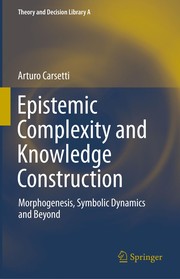Check nearby libraries
Buy this book

As is well known, cognition is not only a self-organising process. It is also a co-operative and coupled process. If we consider the external environment as a complex, multiple and stratified Source which interacts with the nervous system, we can easily realise that the cognitive activities devoted to the "intelligent" search for the depth information living in the Source, may determine the very change of the complexity conditions according to which the Source progressively expresses its "wild" action. In this sense, simulation models are not neutral or purely speculative: the true cognition actually appears to be necessarily connected with successful forms of reading, those forms, in particular, that permit a specific coherent unfolding of the deep information content of the Source. Therefore, the simulation models, if valid, materialise as "creative" channels, i.e., as autonomous functional systems, as the very roots of a new possible development of the entire system represented by mind and its Reality.
Check nearby libraries
Buy this book

Previews available in: English
Showing 1 featured edition. View all 1 editions?
| Edition | Availability |
|---|---|
|
1
Epistemic Complexity and Knowledge Construction: Morphogenesis, symbolic dynamics and beyond
2013, Springer Netherlands, Imprint: Springer
electronic resource :
in English
9400760132 9789400760134
|
aaaa
Libraries near you:
WorldCat
|
Book Details
Table of Contents
Edition Notes
Classifications
The Physical Object
ID Numbers
Community Reviews (0)
Feedback?| June 30, 2019 | Created by MARC Bot | import new book |









